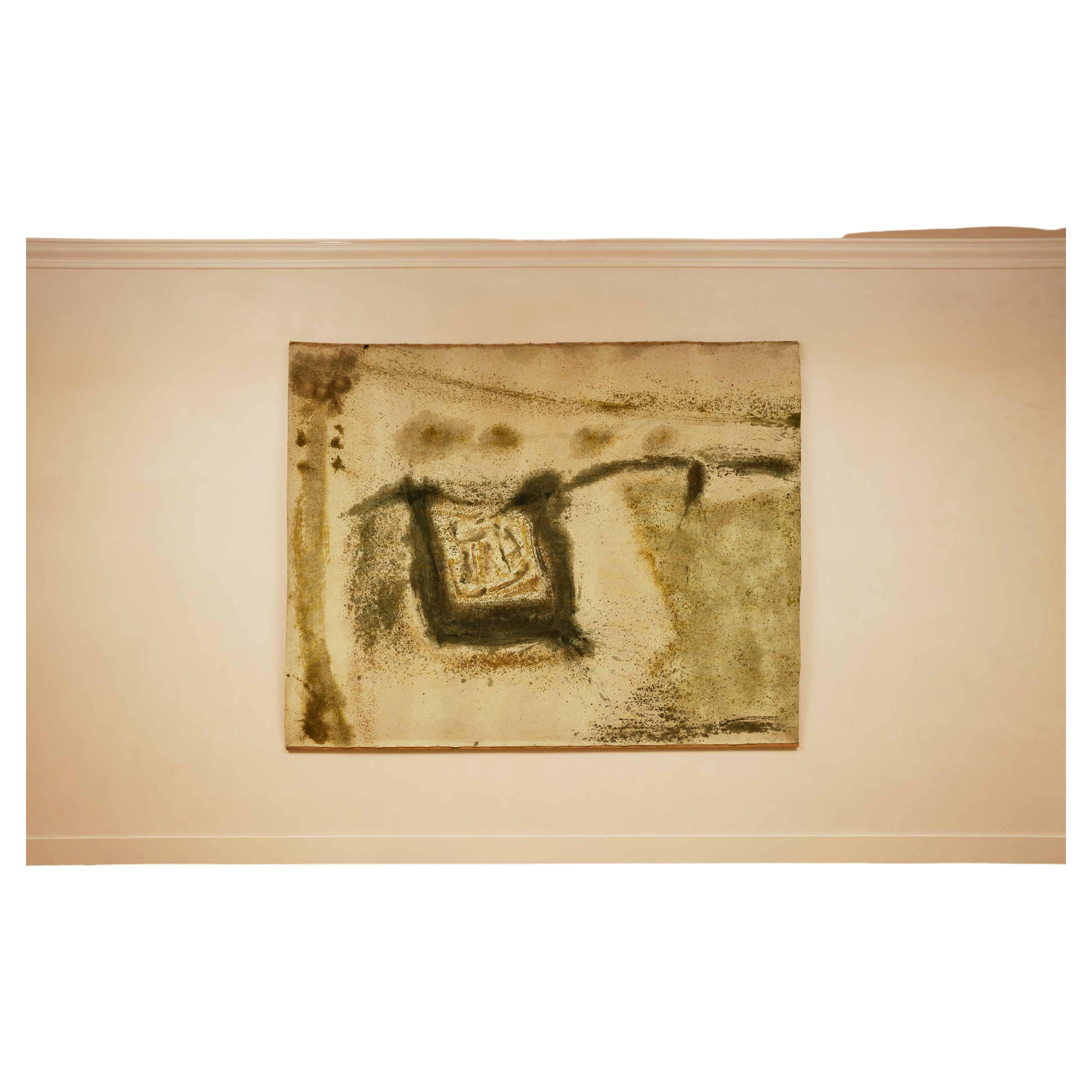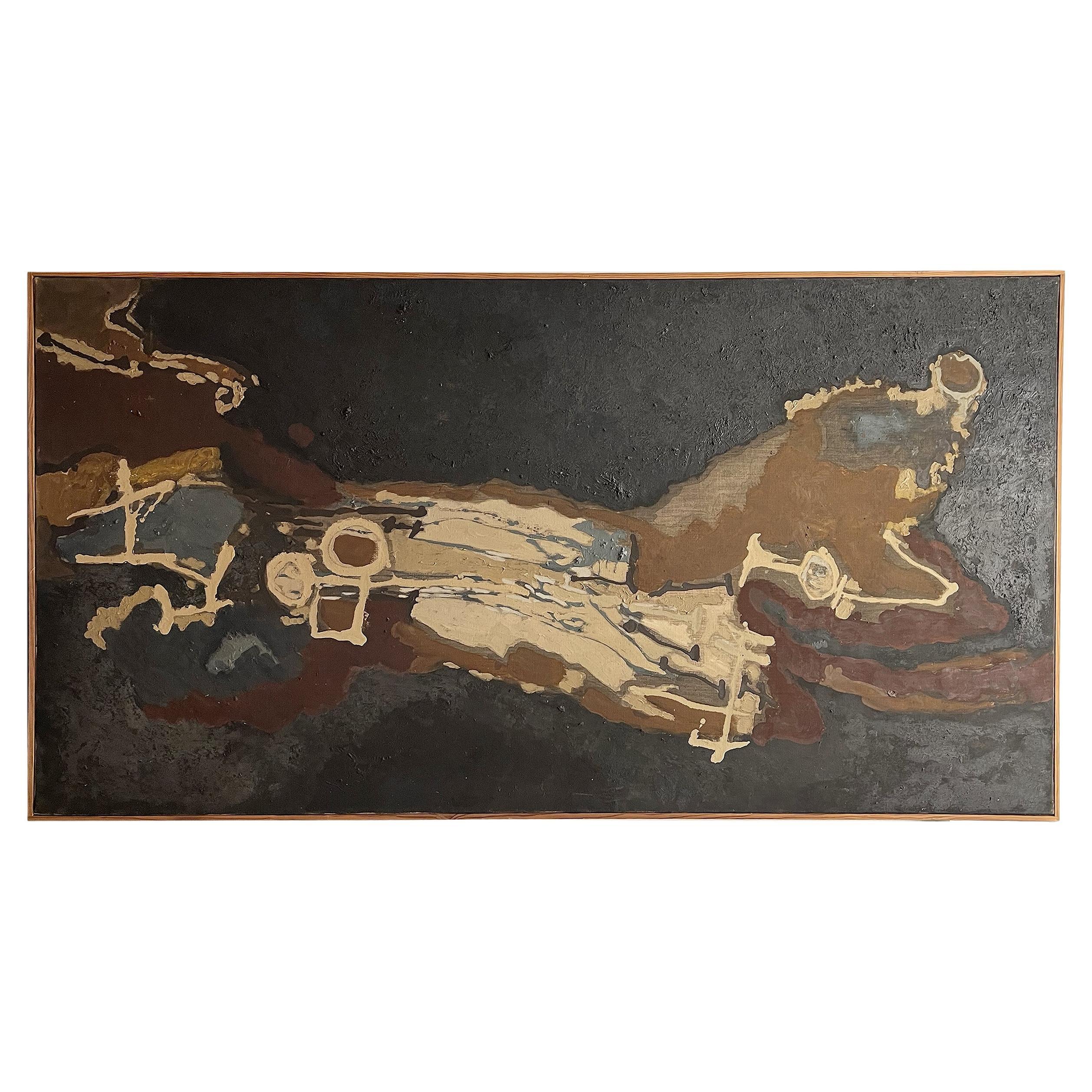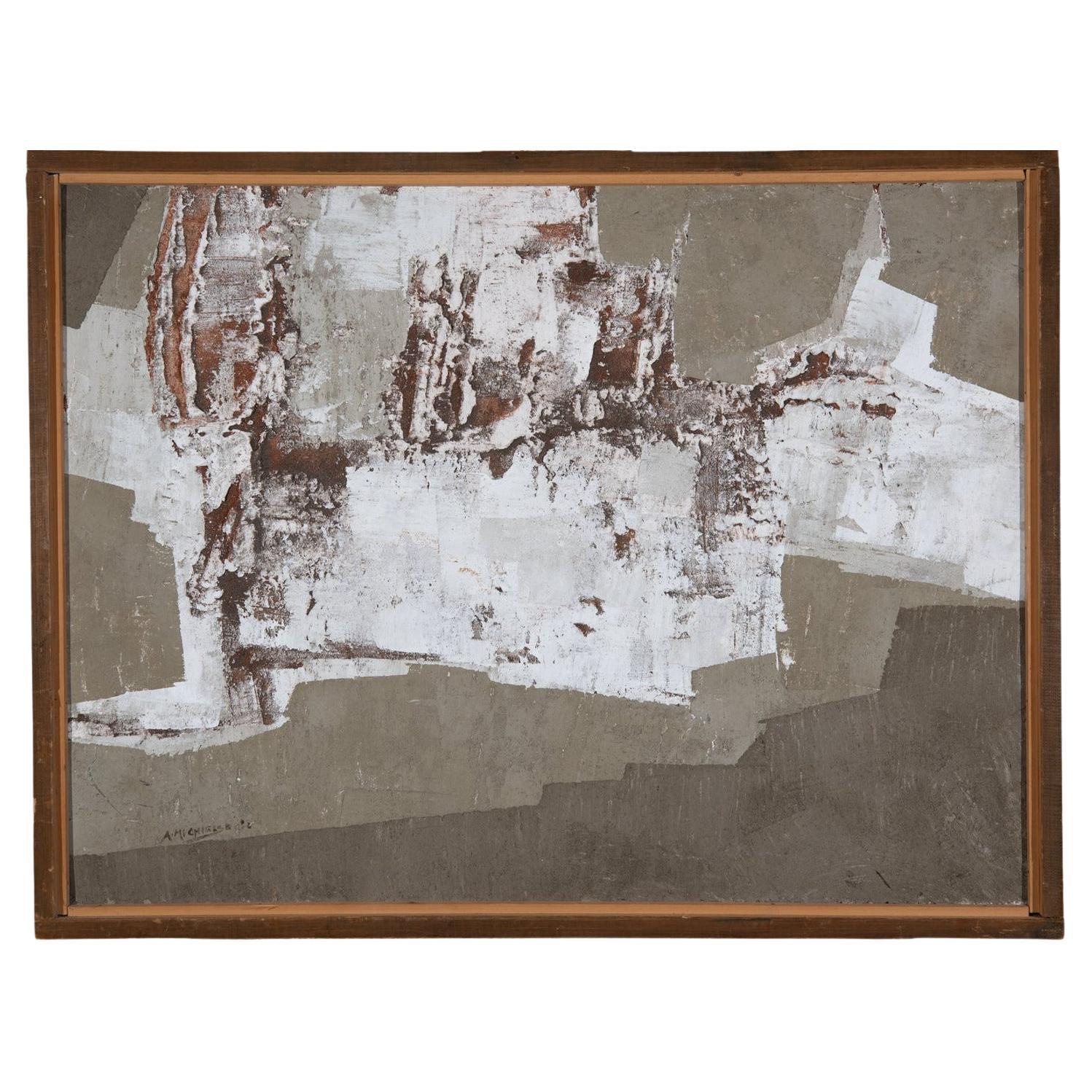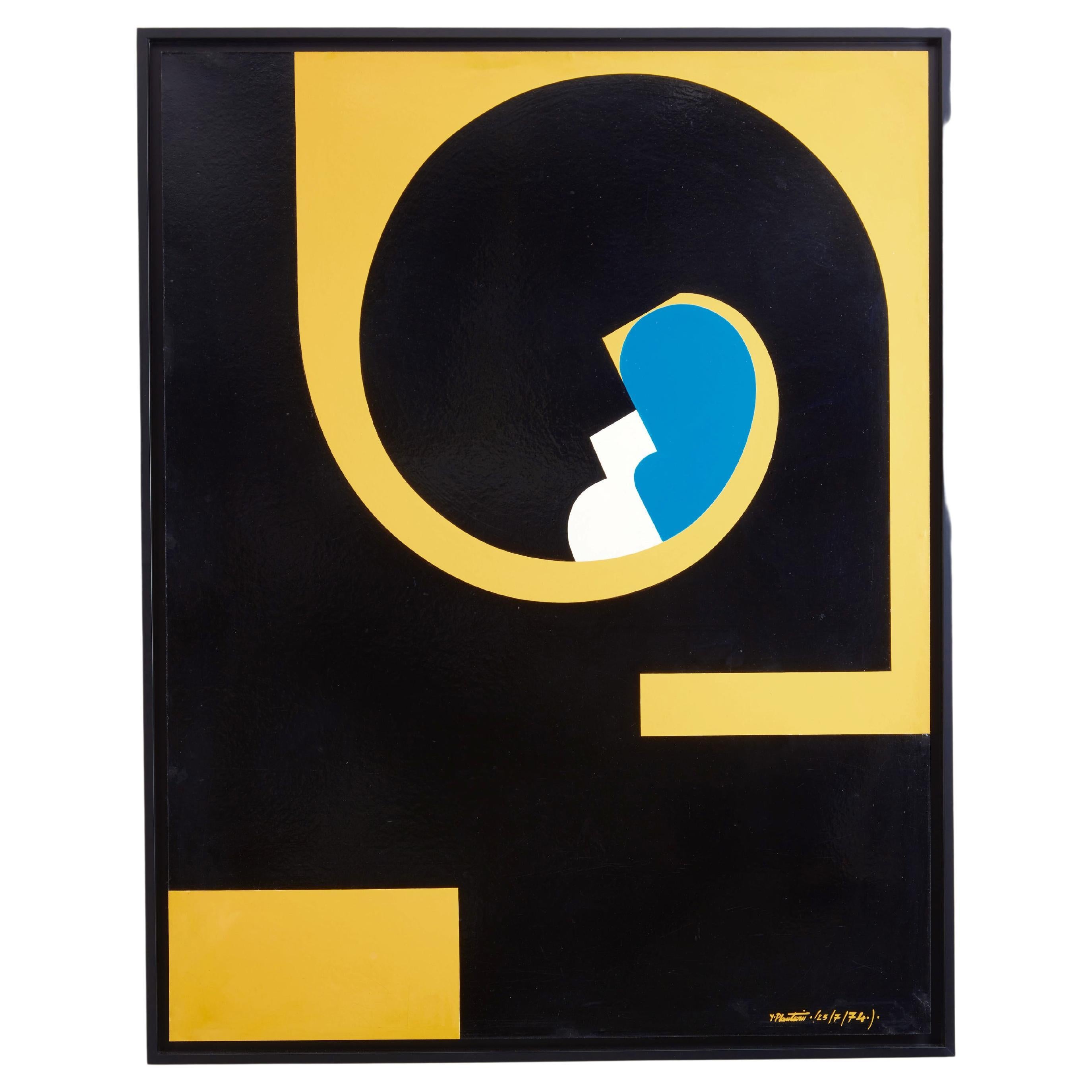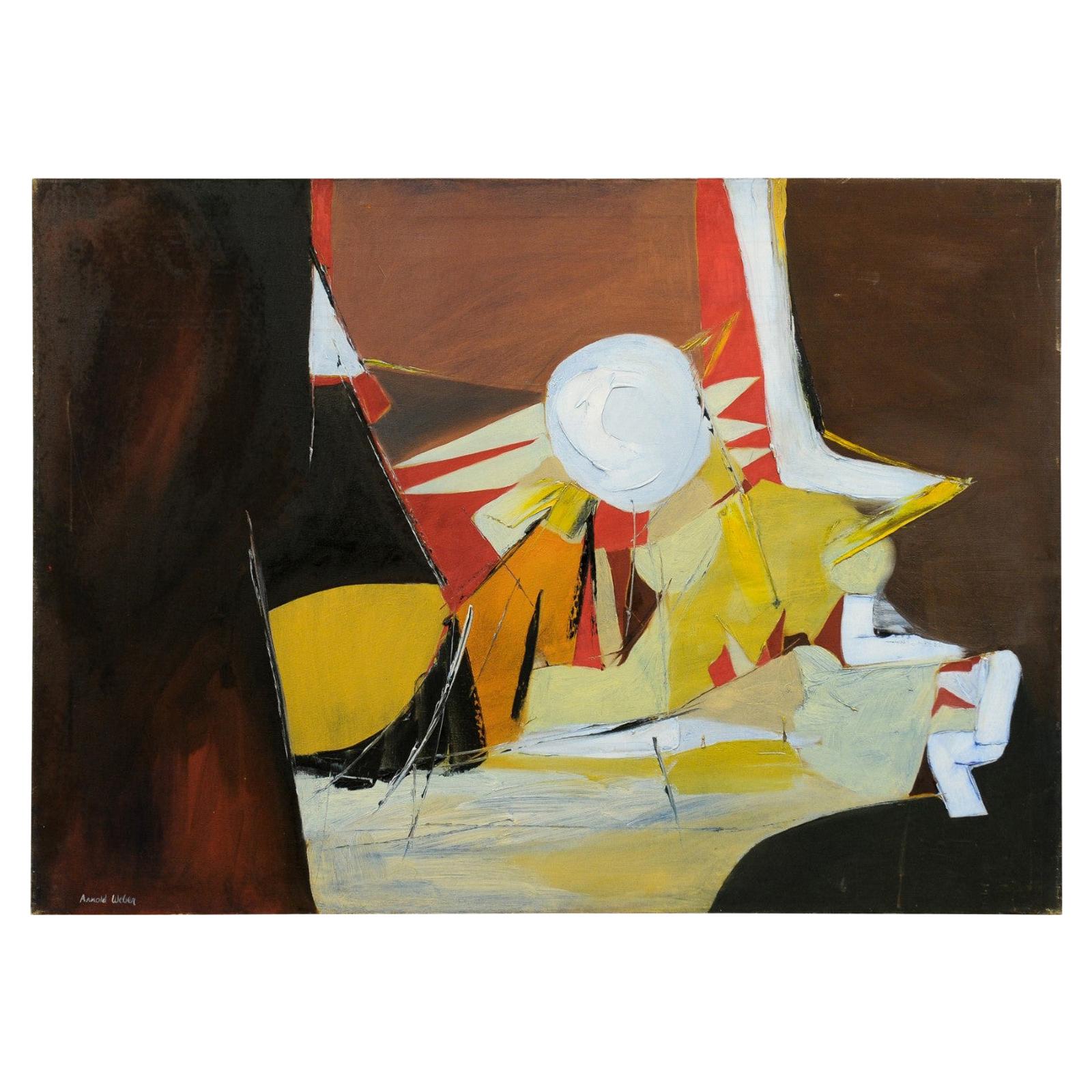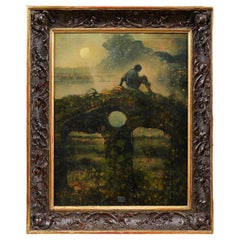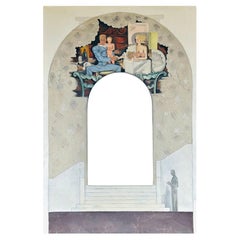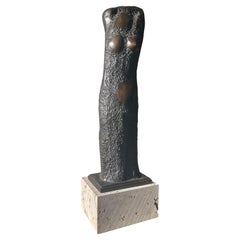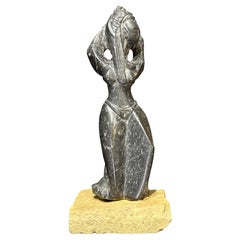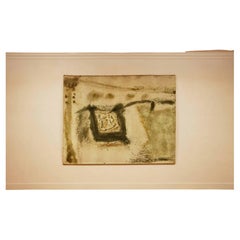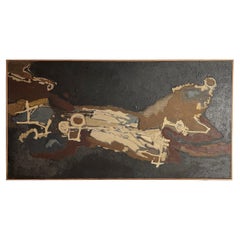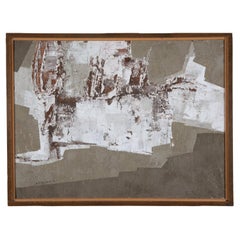Items Similar to Jean Piaubert - "Presence", 1965, Huile, sable et gravier sur panneau intitulé
Want more images or videos?
Request additional images or videos from the seller
1 of 5
Jean Piaubert - "Presence", 1965, Huile, sable et gravier sur panneau intitulé
$9,345.52
£6,955.84
€7,800
CA$12,801.03
A$14,237.54
CHF 7,434.40
MX$173,255.66
NOK 94,948.61
SEK 89,045.05
DKK 59,378.68
Shipping
Retrieving quote...The 1stDibs Promise:
Authenticity Guarantee,
Money-Back Guarantee,
24-Hour Cancellation
About the Item
Jean Piaubert - "Presence", 1965
Technique : Huile, sable et gravier sur panneau
Signature : Signé en bas à droite
Dimensions : H : 60 cm L : 150 cm
Provenance :
Vente Me Lombrail-Teucquam, Hôtel Drouot, Paris, 30 janvier 2001, n°131
Collection de Monsieur L., Haute-Savoie. Acquis lors de cette vente.
Expositions :
Maison de la Culture, Théâtre de Caen, 1 - 30 avril 1967
Mitsukoshi, Tokyo, mars 1970
Galerie des Beaux-Arts, Bordeaux, 10 mars - 10 avril 1972
Galerie Albert Verbeke, Paris, 24 octobre - 24 novembre 1974
Ateliers du Grand Hornu, 17 décembre 1977 - 5 février 1978
Château-Musée, Cagnes-sur-Mer, 6 mai - 10 juin 1978
Catalogue Raisonné :
Cette œuvre est enregistrée dans le catalogue raisonné de l'artiste en cours de préparation par M. Hubert Thiery sous le numéro 1965-046C.
Biographie de Jean Piaubert (1900 - ?)
Né en 1900, Jean Piaubert commence la peinture à 18 ans et intègre l'École des Beaux-Arts de Bordeaux. Il débute dans un atelier de décors de théâtre avant de s'installer à Paris. Après des années difficiles à Montparnasse et à l'académie de la Grande Chaumière, il est repéré par Paul Poiret, qui lui passe commande.
Durant cette période, il rencontre Othon Friesz, Raoul Dufy et André Derain, qui influencent son passage vers une peinture plus colorée. Dans les années 1930, il abandonne la figuration pour atteindre une abstraction totale en 1945. Il expose alors à la Galerie Creuze et devient une figure majeure de l'art abstrait.
Ses œuvres sont aujourd'hui présentes dans plusieurs collections publiques et privées prestigieuses :
Solomon R. Guggenheim Museum, New York
Musée d'Art Moderne de Paris
Stedelijk Museum, Amsterdam
Musée Royal, Bruxelles
Musées de Cologne, Copenhague, Le Havre, Luxembourg, Rome, Saint-Jacques, Strasbourg, Turin, Wuppertal
----------
Jean Piaubert - "Presence", 1965
Medium: Oil, sand, and gravel on panel
Signature: Signed lower right
Dimensions: H: 60 cm W: 150 cm
Provenance:
Sale Me Lombrail-Teucquam, Hôtel Drouot, Paris, January 30, 2001, No. 131
Collection of Mr. L., Haute-Savoie. Acquired during this sale.
Exhibitions:
Maison de la Culture Theater, Caen, April 1 - 30, 1967
Mitsukoshi, Tokyo, March 1970
Galerie des Beaux-Arts, Bordeaux, March 10 - April 10, 1972
Albert Verbeke Gallery, Paris, October 24 - November 24, 1974
Grand Hornu Workshops, December 17, 1977 - February 5, 1978
Château-Musée, Cagnes-sur-Mer, May 6 - June 10, 1978
Catalogue Raisonné:
This work is recorded in the artist's catalogue raisonné, currently being prepared by Mr. Hubert Thiery, under number 1965-046C.
Biography of Jean Piaubert (1900 - ?)
Born in 1900, Jean Piaubert began painting at the age of 18 and attended the École des Beaux-Arts in Bordeaux. He started in a theater design workshop before moving to Paris. After struggling through his early years at the Grande Chaumière Academy and Montparnasse workshops, he was discovered by Paul Poiret, who commissioned several works from him.
During this period, he met Othon Friesz, Raoul Dufy, and André Derain, whose influence led him away from a classical approach towards a more colorful style. In the 1930s, he abandoned figuration to embrace total abstraction in 1945. He then exhibited at Galerie Creuze, gaining recognition as a major figure in abstract art.
Today, his works are featured in several prestigious public
and private collections, including:
Solomon R. Guggenheim Museum, New York
Musée d'Art Moderne de Paris
Stedelijk Museum, Amsterdam
Royal Museum, Brussels
Museums in Cologne, Copenhagen, Le Havre, Luxembourg, Rome, Santiago, Strasbourg, Turin, Wuppertal
- Dimensions:Height: 23.63 in (60 cm)Width: 59.06 in (150 cm)Depth: 1.97 in (5 cm)
- Style:Art Deco (Of the Period)
- Materials and Techniques:
- Place of Origin:
- Period:
- Date of Manufacture:1965
- Condition:Wear consistent with age and use.
- Seller Location:NEUILLY-SUR-SEINE, FR
- Reference Number:1stDibs: LU9892240717362
About the Seller
No Reviews Yet
Recognized Seller
These prestigious sellers are industry leaders and represent the highest echelon for item quality and design.
Established in 1992
1stDibs seller since 2024
- ShippingRetrieving quote...Shipping from: Saint-Ouen-sur-Seine, France
- Return Policy
Authenticity Guarantee
In the unlikely event there’s an issue with an item’s authenticity, contact us within 1 year for a full refund. DetailsMoney-Back Guarantee
If your item is not as described, is damaged in transit, or does not arrive, contact us within 7 days for a full refund. Details24-Hour Cancellation
You have a 24-hour grace period in which to reconsider your purchase, with no questions asked.Vetted Professional Sellers
Our world-class sellers must adhere to strict standards for service and quality, maintaining the integrity of our listings.Price-Match Guarantee
If you find that a seller listed the same item for a lower price elsewhere, we’ll match it.Trusted Global Delivery
Our best-in-class carrier network provides specialized shipping options worldwide, including custom delivery.More From This Seller
View AllEugène Berman (1899-1972) - Oil on canvas "Paludia"
By Eugene Berman
Located in NEUILLY-SUR-SEINE, FR
Eugène Berman - "Paludia" (1967-1968)
Type : Huile sur toile
Signature : Monogrammée en bas au centre, contresignée au dos
Date de création : 1967-Rome-1968
Dimensions : 67 cm x 54 cm
Encadrement : Rare cadre Troubadour en papier mâché, circa 1840
Expositions et provenance :
Étiquette d’exposition de la Galerie Lucie Weill au dos
Annotations de la Galerie Forni à Bologne
Bibliographie :
Galerie Lucie Weill, Les Néo-romantiques: Christian Bérard, Léonid et Eugène Berman, Pavel Tchelitchew, Paris, 1971.
"Paludia" est une huile sur toile réalisée par Eugène Berman entre 1967 et 1968 à Rome. L'œuvre, représentative de son style néo-romantique, est empreinte de mélancolie et de poésie, avec une touche onirique caractéristique de son approche théâtrale de la composition.
Son cadre troubadour en papier mâché, rare et datant de circa 1840, confère à l'œuvre une aura historique et une mise en valeur singulière, dans l'esprit des cabinets de curiosités qu'affectionnait l'artiste.
Biographie d'Eugène Berman (1899-1972) :
Né le 4 novembre 1899 à Saint-Pétersbourg, Eugène Berman est un peintre et décorateur de théâtre d’origine russe, naturalisé américain. Il est le frère de Léonide Berman.
Son éducation artistique débute en Europe occidentale, avec des formations en Allemagne, Suisse et France, où il suit les cours de Pavel Naumov et Sergey Gruzenberg entre 1914 et 1918. Après avoir quitté la Russie en 1918, il étudie à l'Académie Ranson à Paris, sous la direction de Maurice Denis et Édouard Vuillard.
Inspiré par Giorgio de Chirico et Picasso, il expose ses œuvres (portraits et paysages) aux Salons d’Automne et des Tuileries entre 1923 et 1927. Il promeut, aux côtés de son frère, une forme de peinture poétique et symboliste.
En 1935, il émigre aux États-Unis, où il travaille comme décorateur de théâtre tout en poursuivant son œuvre picturale. Il devient citoyen américain en 1937.
Il meurt le 14 décembre 1972, à Rome ou New York.
Cabinet de curiosités et collection personnelle :
Eugène Berman possédait une importante collection d’objets anciens, comprenant :
Céramiques, statuettes, sculptures, verrerie, textiles, tapis de diverses civilisations (précolombienne, africaine, de Nouvelle-Guinée, de Colombie-Britannique, égyptienne, copte, grecque, étrusque, romaine).
Mobilier italien et latino-américain du XVIe et XVIIe siècles.
Œuvres d’amis artistes, dont Mirko, Ernst, Cagli, Cremoni.
Sa collection fut installée dans un appartement romain, transformé en un véritable cabinet de curiosités, situé au dernier étage d’un palais proche de la Piazza del Popolo.
------------
Eugène Berman - "Paludia" (1967-1968)
Type: Oil on canvas
Signature: Monogrammed at the bottom center, countersigned on the back
Creation Date: 1967-Rome-1968
Dimensions: 67 cm x 54 cm
Frame: Rare Troubadour-style papier-mâché frame, circa 1840
Exhibitions and Provenance:
Exhibition label from Galerie Lucie Weill on the back
Annotations from Forni Gallery in Bologna
Bibliography:
Galerie Lucie Weill, The Neo-Romantics: Christian Bérard, Léonid and Eugène Berman, Pavel Tchelitchew, Paris, 1971.
"Paludia" is an oil on canvas created by Eugène Berman between 1967 and 1968 in Rome. Representative of his neo-romantic style, the piece exudes melancholy and poetic introspection, with a dreamlike quality reflecting his theatrical approach to composition.
The rare papier-mâché Troubadour frame, dating from circa 1840, enhances the historical aura of the work, aligning with the artist’s deep appreciation for curiosities and antiquities.
Biography of Eugène Berman (1899-1972):
Born on November 4, 1899, in Saint Petersburg, Eugène Berman was a Russian-born American painter and theater designer. He was the brother of Léonide Berman.
He received his early artistic education in Western Europe, training in Germany, Switzerland, and France, with studies under Pavel Naumov and Sergey Gruzenberg between 1914 and 1918. Leaving Russia in 1918, he studied at Académie Ranson in Paris, under the guidance of Maurice Denis and Édouard Vuillard.
Influenced by Giorgio de Chirico and Picasso, he exhibited his works (portraits and landscapes) at the Salons d’Automne and des Tuileries between 1923 and 1927. Alongside his brother, he championed a poetic and symbolic form of painting.
In 1935, he emigrated to the United States, working as a theater designer while continuing to produce allegorical works. He became an American citizen in 1937.
He passed away on December 14, 1972, in Rome or New York.
Cabinet of Curiosities and Personal Collection:
Eugène Berman owned a significant collection of antique artifacts, including:
Ceramics, statuettes, sculptures, glassware, textiles, and rugs from Pre-Columbian, African, New Guinea, British Columbia, Egyptian, Coptic, Greek, Etruscan, and Roman civilizations.
Italian and Latin American furniture...
Category
Vintage 1960s North American American Classical Paintings
Materials
Paint
Georges Lepape - "La Femme, l'Enfant et la Famille", Peinture et Miroir
By Georges Lepape
Located in NEUILLY-SUR-SEINE, FR
Georges Lepape (1887-1971) - "La Femme, l'Enfant et la Famille"
Technique : Techniques mixtes sur toile
Date de création : Vers 1937
Dimensions : H : 195 cm L : 131 cm
Signature : Signé dans le décor
Historique :
Ce projet constitue une étude préparatoire pour la fresque réalisée en 1937 par Georges Lepape. L'œuvre finale décorait l'arc d'entrée du Pavillon de la Femme, de l'Enfant et de la Famille lors de l'Exposition Universelle de Paris.
Bibliographie :
Claude LEPAPE...
Category
Vintage 1930s French Art Deco Paintings
Materials
Mirror, Paint
Aristidis Patsoglou - Bronze à Patine Brune (Figure Féminine)
Located in NEUILLY-SUR-SEINE, FR
Aristidis Patsoglou - Bronze à Patine Brune (Figure Féminine)
Type : Bronze à patine brune
Signature : Signé et numéroté 1/8
Dimensions : H : 70 cm L : 20 cm P : 16 cm
Descriptio...
Category
Mid-20th Century French Art Deco Abstract Sculptures
Materials
Bronze
Georges Oudot - Sculpture en Marbre fossile noir
By Georges Oudot
Located in NEUILLY-SUR-SEINE, FR
Rare Sculpture en Taille Directe sur Marbre Fossile Noir
Type : Sculpture en taille directe
Matériaux : Marbre fossile noir, base en pierre
Date de création : Circa 1950-1960
Dimens...
Category
Vintage 1950s French Art Deco Figurative Sculptures
Materials
Stone
Miçao Kono - "Woman with Cat" (1934) - Huile sur toile
By Micao Kono
Located in NEUILLY-SUR-SEINE, FR
Miçao Kono - "Woman with Cat" (1934)
Type : Huile sur toile
Signature : Signée et datée 1934 en bas à gauche et au dos de l’œuvre
Encadrement : Exceptionnel cadre Art Déco en marqu...
Category
Mid-20th Century Japanese Art Deco Paintings
Materials
Paint
Paire Exceptionnelle de Colonnes "Cubisantes" Bois de Palmier - 1930
By Pierre-Emile Legrain
Located in NEUILLY-SUR-SEINE, FR
Travail Français, 1930 - Paire Exceptionnelle de Colonnes "Cubisantes" en Placage de Bois de Palmier
Date de création : 1930
Matériaux : Placage de bois de palmier, plaque de verre gravé et doré
Dimensions : H : 126,5 cm
Condition : Usure et légers éclats de placage
Exceptionnelle paire de colonnes "cubisantes" en placage de bois de palmier, ornées sur une face d'une plaque de verre gravée représentant des personnages stylisés sculptés et rehaussés d'or.
Attribution :
Cette paire de colonnes pourrait être attribuée à Gustave Miklos ou Pierre Legrain, deux figures emblématiques de l'époque. On y retrouve :
L'utilisation de placages épais en bois de palmier, récurrente dans l'œuvre de Pierre Legrain, inspirée par un esprit africaniste propre à son travail.
Des figures stylisées gravées sur verre, typiques du langage cubiste de Gustave Miklos.
Contexte et importance historique :
Le design de ces colonnes rappelle le bureau cubisant de Pierre Legrain, livré en 1927 à Maurice Martin...
Category
Vintage 1930s French Art Deco Pedestals
Materials
Glass, Palmwood
You May Also Like
Large oil on canvas by Rene Allio (1924-1995). France
By René
Located in Ventura, CA
Large oil on canvas by Rene Allio (1924-1995). France René Allio was a director, screenwriter, theatre designer. He would also paint some immense nonfigurat...
Category
Vintage 1960s French Paintings
Materials
Canvas
"Personnage dans l'arbre", oil on canvas by Paul Ackerman, France, circa 1945
Located in Paris, FR
Large oil on canvas by Paul Ackerman, entitled « personnage dans l’arbre » (« character in a tree »).
Biography
Paul Ackerman, Romania-France (1908-1981)
Paul Ackerman is a Romanian painter, lithographer, sculptor and theater designer, living in France since 1912, he belongs to the School of Paris .
Paul Ackerman was four years old when, in 1912, his father, a company director and great art lover, decided, out of constraint in the face of « the anti-Semitism which is a harsh reality in Romania », to come and settle in Paris, in a large villa facing the Bois de Vincennes. He did his secondary studies at the Lycée Charlemagne (where he befriended Gabriel Arout, future playwright for whom he would later design the sets), then at the Ecole Alsacienne. From 1925, Ackerman studied law and letters at the Sorbonne, but, frequenting the Louvre Museum assiduously, he knew that his vocation lay elsewhere.
In 1933, Paul Ackerman met Simone Laverrière, a native of Royan, whom he married in 1935. In 1936, in his studio at 100, rue du Faubourg Saint-Honoré, he designed projects for posters, fabrics and jewelry for Elsa Schiaparelli and Marcel Rochas while visiting Fernand Leger’s studio.
In 1939 Paul Ackerman was mobilized, taken prisoner then released, he found his wife Simone in Vichy where he was expelled as a Jew and left for Saint-Tropez. He then leads a cloistered life in the south of France, made up of small means (painting on...
Category
Vintage 1940s French Paintings
Materials
Canvas
Jacques Fabert "Decouverte" Painting, 1962
By Jacques Fabert
Located in New York, NY
Original oil on board "Decouverte" with abstract figural motif by Jacques Fabert. Originally part of an exhibition in San Francisco 1962. Signed and labeled on verso as well as a lab...
Category
Vintage 1960s American Modern Paintings
Materials
Paint
Vlucht Painting by Anton Michielse, 1978
Located in AMSTERDAM, NL
Flight by Anton Michielse is a powerful exploration of texture and form, crafted with industrial materials like panslag, cement, plaster, and black sand. Anchored by a central, layer...
Category
20th Century Contemporary Art
Materials
Abalone
$1,351 Sale Price
53% Off
Yves Plantevin huge oil on wood panel 1974
Located in Paris, IDF
This is a very large and graphic oil on wood panel by French artist Yves Plantevin, signed Y.Plantevin and dated 1974 in the lower right corner. It’s been framed with a black shadow ...
Category
Vintage 1970s French Mid-Century Modern Paintings
Materials
Paint
Fabulous Contemporary Painting by Arnold Weber, circa 1970
By Arnold Weber
Located in Atlanta, GA
A fabulous modern abstract by enormously talented Arnold Weber (1931-2010). Tremendous mood and energy. Expert use of vibrant color that will bring a smile to your face. This Killer ...
Category
Vintage 1970s American Mid-Century Modern Paintings
Materials
Canvas
More Ways To Browse
Used Sable
Haute Savoie Furniture
5 Octobre
Antique Cast Bronze Bells
Antique China Cabinet With Mirror
Antique Fashion Clocks
Antique Idols
Antique Ivory Chest
Antique Japanese Cupboard
Antique Kitchen Queen Cabinet
Antique Liquor Cabinet
Antique Mahogany Chests And Dressers
Antique Money Chest
Antique Oak Curved Glass
Antique Persian Plates
Antique Rulers Wood
Antique Walnut China Cabinet
Art Deco Bathroom Cabinet
